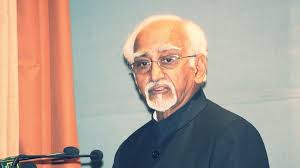Introduction
The recent dispatch of humanitarian relief by India to Palestine, amid the ongoing Israel-Hamas conflict, has drawn attention and sparked a discourse on India’s foreign policy decisions. Former Vice President of India, Hamid Ansari, has offered his perspective on the matter, suggesting that such support to Palestine should have been extended earlier. This article provides an in-depth analysis of Ansari’s viewpoint, the context surrounding India’s relief efforts, and the broader implications for India’s foreign policy in the Middle East.

Former Vice President Hamid Ansari’s Remark
Former Vice President Hamid Ansari’s statement reflects a viewpoint shared by some within India’s political and diplomatic circles. His assertion that India’s relief to Palestine “should’ve been done earlier” sheds light on the evolving dynamics of India’s engagement with the Israel-Palestine conflict.
The Context of India’s Relief to Palestine
- Humanitarian Aid: India’s provision of humanitarian assistance to Palestine during times of conflict is rooted in its commitment to humanitarian principles and its historical support for the Palestinian cause.
- Consistent Stance: India has maintained a longstanding policy in favor of a two-state solution in the Israel-Palestine conflict. This position aims to ensure the coexistence of Israel and Palestine as independent states, living side by side in peace and security.
- Balancing Act: India’s foreign policy in the Middle East is a delicate balancing act. It seeks to maintain strong diplomatic and economic ties with Israel while also demonstrating support for the Palestinian people and their aspirations for statehood.
Implications and Considerations
- Historical Perspective: Hamid Ansari’s viewpoint echoes the sentiments of those who have advocated for a more proactively supportive stance toward Palestine. The call for earlier assistance signifies the evolving nature of India’s foreign policy decisions.
- Strategic Diplomacy: India’s nuanced approach toward the Israel-Palestine issue underscores its strategic diplomatic positioning in the Middle East. It aims to leverage its relations with both Israel and Palestine to further its interests in the region.
- Regional Dynamics: India’s actions are in the context of the broader Middle East geopolitical landscape, where the Israel-Palestine issue has implications for regional stability, energy security, and global diplomacy.
- Global Perception: India’s stance on the Israel-Palestine conflict and its humanitarian assistance to Palestine can shape global perceptions of its foreign policy values and priorities.
Conclusion
Former Vice President Hamid Ansari’s perspective on India’s humanitarian relief to Palestine highlights the complex nature of India’s foreign policy in the Middle East. India’s commitment to humanitarian principles and support for the Palestinian cause is apparent, but its actions are carefully weighed in the context of regional dynamics and strategic diplomacy. As India navigates the challenges of balancing relations with Israel and Palestine, its evolving stance on the Israel-Palestine conflict will continue to influence global perceptions of its foreign policy and its role in regional stability.